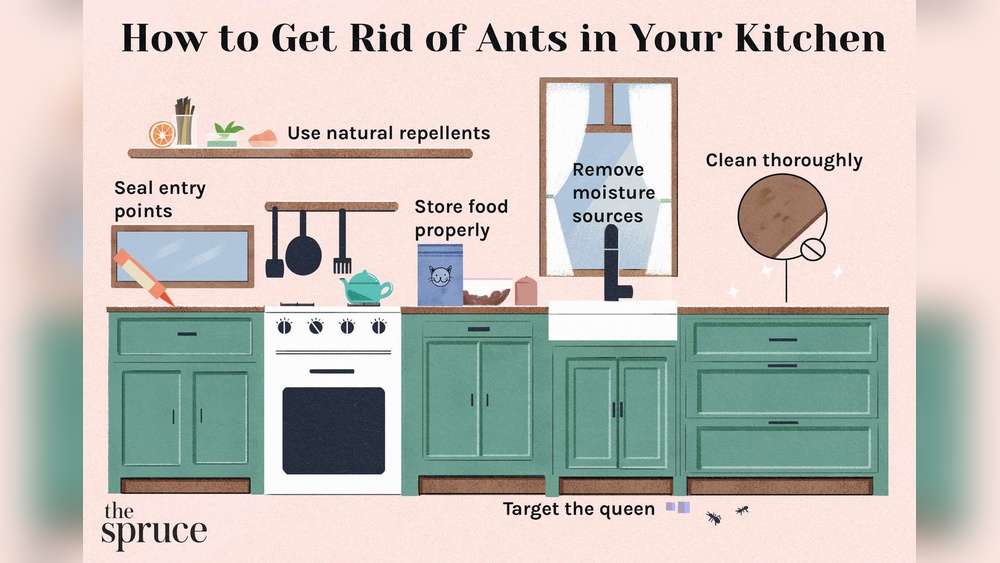Are tiny ants invading your kitchen and refusing to leave? You’re not alone—and more importantly, you don’t have to live with them.
These small intruders might seem harmless, but they can quickly become a big nuisance, crawling over your counters and getting into your food. The good news? You can take control and get rid of these tiny ants for good. You’ll discover simple, effective steps that anyone can follow to stop ants from taking over your kitchen.
Ready to reclaim your space and enjoy a pest-free kitchen? Keep reading to learn how to make those ants disappear—once and for all.
Ant Attraction Factors
Food sources in the kitchen attract tiny ants easily. Crumbs, spills, and open containers offer them easy meals. Sweet and greasy foods are their favorite. Keeping food sealed and cleaning up spills quickly can help reduce ant visits.
Common entry points include cracks, gaps around windows, doors, and walls. Ants use these small openings to enter your kitchen. Sealing these gaps with caulk or weather stripping blocks their path effectively.
Moisture and shelter also draw ants inside. Leaky pipes, damp areas, and clutter provide a good home for them. Fixing leaks and keeping the kitchen dry makes it less attractive for ants to stay.

Vinegar As An Ant Deterrent
Vinegar disrupts ant scent trails that ants use to find food. Its strong smell confuses them and stops their path. The effect lasts only a few hours to a few days because the smell fades after drying.
To prepare a vinegar solution, mix equal parts of white vinegar and water in a spray bottle. This makes a safe, effective spray to keep ants away without strong fumes.
Spray the vinegar solution on places where ants enter, like door frames, windowsills, and floors. You can also spray it directly on ants and wipe them away. Regular cleaning with this mix helps remove their scent trails.
Vinegar does not kill the ant colony. It only masks their trails temporarily. Frequent reapplication is needed to keep ants from returning. It works best combined with other control methods.
Diy Ant Baits
A simple borax and sugar mixture works well to attract and kill tiny ants. Mix 1 part borax with 3 parts sugar. The sugar lures ants, and borax kills them. Place this mixture on small pieces of paper or in bottle caps for bait stations.
Set bait stations near ant trails, corners, or places with food crumbs. Keep baits away from children and pets. Replace the bait every few days until ants disappear. Use small containers to avoid spills.
Safety is important. Borax can be harmful if swallowed in large amounts. Store baits out of reach of kids and pets. Wash your hands after handling borax. Avoid placing baits where food is prepared or eaten.
:max_bytes(150000):strip_icc()/TheSpruce_Howtogetridofandpreventodoroushouseants_colorv1-d55f1b3ffb8f44e1a34ba6d0a07bd4a0.png)
Natural Repellents
Essential oils like peppermint, tea tree, and lemon oil work well to repel ants. Their strong smells confuse ants and keep them away.
Sprinkle or place herbs such as cinnamon, cloves, and bay leaves near ant trails. These spices act as natural barriers ants avoid.
Citrus peels from lemons, oranges, or limes can be placed around your kitchen. The oils in the peels disrupt the ants’ scent paths, making it hard for ants to find food.
Cleaning And Prevention
Removing food residue is key to stop tiny ants. Clean up crumbs, spills, and sticky spots immediately. Store food in sealed containers. Avoid leaving pet food out for long periods. Ants are drawn to sugary and greasy substances. Regularly wipe kitchen surfaces with mild soap and water. This removes food traces that attract ants.
Regular surface cleaning helps keep ants away. Clean counters, sinks, and floors daily. Use a mixture of vinegar and water to wipe surfaces. Vinegar masks the scent trails ants use to find food. Clean behind appliances and under cabinets too. This reduces ant hiding spots and food sources.
Sealing cracks and openings stops ants from entering. Check walls, windows, and doors for small gaps. Use caulk or weather stripping to close these entry points. Pay attention to pipes and vents as well. Blocking these spots keeps ants outside your kitchen.
When To Call Professionals
Signs of large infestations include seeing many ants at once or finding multiple trails. You might notice ants inside cupboards or near food packages. Ants may also appear in other rooms beyond the kitchen. If ants keep coming back despite cleaning, the problem is likely serious.
Benefits of professional treatment are many. Professionals use strong, safe methods to remove ants completely. They know where ants hide and how to stop them from returning. Treatment saves time and effort compared to home remedies. Professionals can also prevent damage caused by ants.
| Choosing a Pest Control Service |
|---|
| Check if the company is licensed and insured. |
| Ask about the methods and chemicals they use. |
| Look for good reviews and recommendations. |
| Compare prices but don’t choose only by cost. |
| Ensure they offer follow-up visits if needed. |

Frequently Asked Questions
Why Do I Get Tiny Ants In My Kitchen?
Tiny ants invade kitchens searching for food, especially sugary or greasy crumbs and spills. They follow scent trails to find these sources.
How Long Will Vinegar Keep Ants Away?
Vinegar keeps ants away for a few hours to a few days by masking their scent trails. Reapply regularly for best results.
How Do I Get Rid Of Little Ants On My Kitchen Counter?
Clean kitchen counters thoroughly to remove food crumbs. Spray a mixture of equal parts vinegar and water on ants and entry points. Wipe ants away and reapply regularly to disrupt their scent trails. Seal cracks to prevent entry and keep surfaces dry.
How Do I Find Out Where Ants Are Coming From In My Kitchen?
Trace ants by following their trail from food sources to entry points like cracks or gaps. Check behind appliances and along baseboards for nests or openings.
Conclusion
Tiny ants in your kitchen can be frustrating and persistent. Clean all food crumbs and spills quickly to remove their attraction. Seal entry points like cracks and gaps to block their access. Use natural sprays such as vinegar regularly to confuse ant trails.
Remember, these steps reduce ants but may not fully remove colonies. Stay patient and consistent with your efforts. A clean kitchen and careful monitoring keep ants away for good. Small actions make a big difference in maintaining an ant-free kitchen.

Yes, working as , Food Blogger and Product Reviewer for last 6 years. Here you will get amazing deals for Smart kitchen products. I am your best source for the latest update in cooking trends. I provide insightful articles, reviews, and analysis on cutting-edge kitchen gadget. My mission is to empower readers with the knowledge they need to stay ahead in a rapidly evolving coking world. Join me as we explore the future of food technology and how it shapes our lives today and tomorrow.





